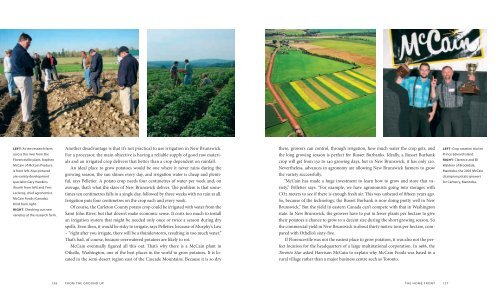From the Ground Up - McCain Foods Limited
From the Ground Up - McCain Foods Limited
From the Ground Up - McCain Foods Limited
You also want an ePaper? Increase the reach of your titles
YUMPU automatically turns print PDFs into web optimized ePapers that Google loves.
LEFT: At <strong>the</strong> research farm,<br />
across <strong>the</strong> river from <strong>the</strong><br />
Florenceville plant. Stephen<br />
<strong>McCain</strong> of <strong>McCain</strong> Produce<br />
is front left. Also pictured<br />
are variety development<br />
specialist Gary Hawkins<br />
(fourth from left) and Yves<br />
Leclercq, chief agronomist,<br />
<strong>McCain</strong> <strong>Foods</strong> (Canada),<br />
third from right.<br />
rIGhT: Checking out new<br />
varieties at <strong>the</strong> research farm.<br />
Ano<strong>the</strong>r disadvantage is that it’s not practical to use irrigation in New Brunswick.<br />
For a processor, <strong>the</strong> main objective is having a reliable supply of good raw materials<br />
and an irrigated crop delivers that better than a crop dependent on rainfall.<br />
An ideal place to grow potatoes would be one where it never rains during <strong>the</strong><br />
growing season, <strong>the</strong> sun shines every day, and irrigation water is cheap and plentiful,<br />
says Pelletier. A potato crop needs four centimetres of water per week and, on<br />
average, that’s what <strong>the</strong> skies of New Brunswick deliver. The problem is that sometimes<br />
ten centimetres falls in a single day, followed by three weeks with no rain at all.<br />
Irrigation puts four centimetres on <strong>the</strong> crop each and every week.<br />
Of course, <strong>the</strong> Carleton County potato crop could be irrigated with water from <strong>the</strong><br />
Saint John River, but that doesn’t make economic sense. It costs too much to install<br />
an irrigation system that might be needed only once or twice a season during dry<br />
spells. Even <strong>the</strong>n, it would be risky to irrigate, says Pelletier, because of Murphy’s Law<br />
– “right after you irrigate, <strong>the</strong>re will be a thunderstorm, resulting in too much water.”<br />
That’s bad, of course, because overwatered potatoes are likely to rot.<br />
<strong>McCain</strong> eventually figured all this out. That’s why <strong>the</strong>re is a <strong>McCain</strong> plant in<br />
O<strong>the</strong>llo, Washington, one of <strong>the</strong> best places in <strong>the</strong> world to grow potatoes. It is located<br />
in <strong>the</strong> semi-desert region east of <strong>the</strong> Cascade Mountains. Because it is so dry<br />
<strong>the</strong>re, growers can control, through irrigation, how much water <strong>the</strong> crop gets, and<br />
<strong>the</strong> long growing season is perfect for Russet Burbanks. Ideally, a Russet Burbank<br />
crop will get from 130 to 140 growing days, but in New Brunswick, it has only 120.<br />
Never<strong>the</strong>less, advances in agronomy are allowing New Brunswick farmers to grow<br />
<strong>the</strong> variety successfully.<br />
“<strong>McCain</strong> has made a huge investment to learn how to grow and store that variety,”<br />
Pelletier says. “For example, we have agronomists going into storages with<br />
CO2 meters to see if <strong>the</strong>re is enough fresh air. This was unheard of fifteen years ago.<br />
So, because of <strong>the</strong> technology, <strong>the</strong> Russet Burbank is now doing pretty well in New<br />
Brunswick.” But <strong>the</strong> yield in eastern Canada can’t compete with that in Washington<br />
state. In New Brunswick, <strong>the</strong> growers have to put in fewer plants per hectare to give<br />
<strong>the</strong>ir potatoes a chance to grow to a decent size during <strong>the</strong> short growing season. So<br />
<strong>the</strong> commercial yield in New Brunswick is about thirty metric tons per hectare, compared<br />
with O<strong>the</strong>llo’s sixty-five.<br />
If Florenceville was not <strong>the</strong> easiest place to grow potatoes, it was also not <strong>the</strong> perfect<br />
location for <strong>the</strong> headquarters of a large multinational corporation. In 1988, <strong>the</strong><br />
Toronto Star asked Harrison <strong>McCain</strong> to explain why <strong>McCain</strong> <strong>Foods</strong> was based in a<br />
rural village ra<strong>the</strong>r than a major business centre such as Toronto.<br />
136 f rom <strong>the</strong> <strong>Ground</strong> up<br />
<strong>the</strong> home front 137<br />
LEFT: Crop rotation trial on<br />
Prince Edward Island.<br />
rIGhT: Clarence and Eil<br />
Waldner of Brookdale,<br />
Manitoba, <strong>the</strong> 2005 <strong>McCain</strong><br />
champion potato growers<br />
for Carberry, Manitoba.






